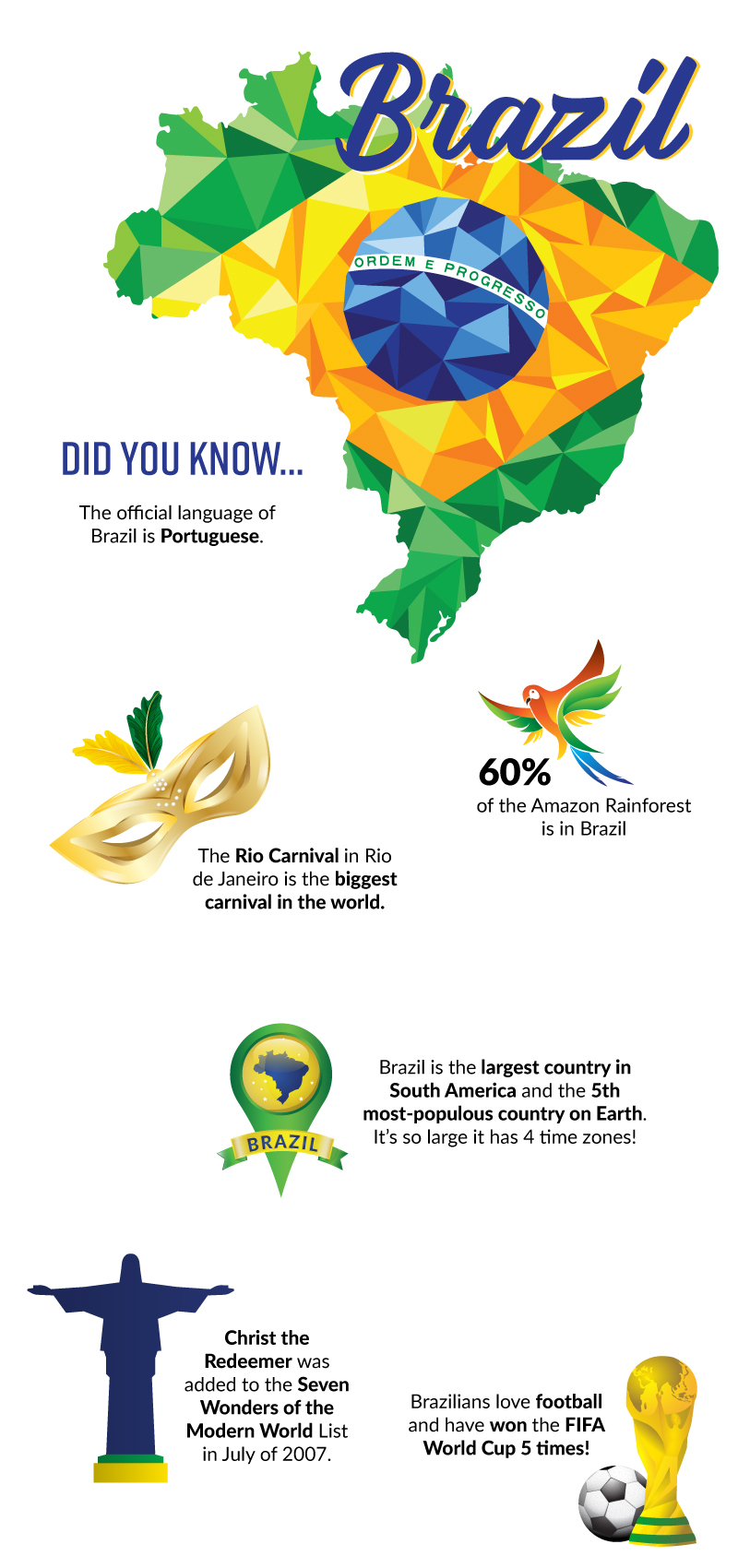Challenges for Brazilians Learning English
Challenges for Brazilians Learning English
English is a funny language. We’ve often talked about its quirks and general wonkiness that can make it difficult to master, but English can present much more specific issues to language learners depending on their background, native language, and how they are studying to learn it. Brazilians face certain challenges when it comes to learning to speak English, for a few different reasons.
Some languages overlap with others when it comes to vocabulary and certain grammar rules, making them a bit easier to pick up. Others don’t even use the same alphabet. There are phonemes specific to languages that may or may not occur in the language you wish to learn, and you’ll have to teach your mouth how to shape sounds you may not even be able to audibly distinguish at first.
As with everything else, you’ll get better with time as long as you continue to practice and study. One of the key parts of that bit of wisdom is the practicing — you simply can’t read your way to fluency. Language has a cadence, a rhythm, a flow to it that you just can’t learn from a book. And depending on your native language, it might be unlike anything you are used to hearing or saying.
Brazil’s Native Language – Portuguese
The official language of Brazil is Portuguese, a western Romance language of the Indo-European language family. It is also an official language of Portugal, Cape Verde, Angola, Mozambique, Guinea-Bissau and São Tomé and Príncipe, as well as having co-official language status in East Timor, Equatorial Guinea, and Macau. A Portuguese-speaking person or nation is referred to as “Lusophone” (lusófono). Portuguese is the ninth most spoken language in the world, with over 257,000,000 speakers.
The Portuguese spoken in Brazil, however, is different from the Portuguese spoken in Europe and is referred to as Brazilian Portuguese. This article lists 16 different dialects within Brazilian Portuguese alone.
As a member of the Romance languages, Portuguese shares some commonalities with the Spanish spoken in Brazil’s neighboring countries. Spanish would certainly be one of the easier languages to pick up for most Brazilians, as it shares almost 90% of its vocabulary with Portuguese. Many schools in Brazil teach both English and Spanish as secondary languages, but despite that curriculum in private and public schools, English proficiency in Brazil is relatively low. So while Brazil has one of the largest numbers of non-native English students in the world, it doesn’t translate to a proficient population of English speakers. According to Cassius Gonçalves, you would need to attend private English tutoring classes and pay exorbitant fees to gain mastery of the language, as the public and private school systems fail to adequately educate students in speaking, reading, listening and writing English. As they so aptly put it, “In Brazil, (almost) everybody studies English but nobody speaks it.”

Overcoming Issues Learning English
Speaking of speaking it, there are a number of specific pronunciation challenges that Brazilians face when studying English as a second language. We covered many in our blog Common Pronunciation Challenges for Brazilians Learning English, and we’ll highlight a few on this page. So again, while Brazilian students study English in school, English itself is not often spoken throughout the day. When you aren’t regularly speaking a language you are learning, it’s incredibly difficult to become fluent. You may be learning plenty of vocabulary and grammar rules, but you aren’t able to easily and freely converse with another speaker, and your pronunciation may not be clear without that practice. Listening to others speaking English is just as important as speaking it yourself, and both are vital to being able to make yourself understood.
Vowels Can Get Confusing
Getting Vowel Sounds Mixed Up
Brazilian Portuguese has fewer vowels/vowel sounds than English along with a few nasal sounds that don’t even exist in English. As with many other language speakers, pronunciation of the vowels in English can be pretty tricky for Brazilian speakers. As an example, Brazilian speakers might pronounce “bit” and “beat” as if they were the same word, and the same would go for “full” and “fool.” They may also pronounce “man” as “men” because the A sound in “man” just doesn’t exist in Brazilian Portuguese.
Past Tense Trickery – Saying the –ED
In English, past tense verbs often use an “ed” ending in which the vowel is mostly silent. So a word like “learned” would be pronounced like “lurnd” and not like “lurn-ehd.” In Portuguese, consonant clusters are fairly rare, so Brazilian speakers may find it makes more sense to vocalize the E (“lurn-ehd” instead of “lurnd”).
Adding “ee” at the End of Words
This can be a pretty specific tell that you’re listening to a Brazilian speaking English. Brazilian Portuguese doesn’t have many words that end in a consonant, so sometimes when Brazilian speakers are speaking English, they’ll add a vowel sound (often an “ee”) to the end of English words. Brazilian Portuguese has an almost musical, lilting quality, and the flow between words lends to it. Adding the “ee” sound at the end of a word mimics that flow more closely, so pay attention to it.
Those Pesky Consonants Aren’t Much Easier
Mispronouncing the TH
As it’s not that common outside of English, many ESL learners struggle with pronouncing the TH sound, and Brazilians are no exception. As Brazilian Portuguese doesn’t use the TH sound, Brazilian speakers will often substitute similar sounds such as F or S for a soft TH, or they may use a T or D sound for a voiced TH. This can sound something like “baf” or “bas” instead of “bath” or “der” instead of “there.”
Getting the H and R Mixed Up
In Portuguese, the letter R is pronounced somewhat like the English letter H, so it’s not surprising that many Brazilian speakers confuse the H and R when speaking English. For example, they may read the English R as H, mispronouncing words like “run” as “hun” or “rate” with “hate.”
Using W in Place of L
This one can be a surprise to a native English speaker, as many Brazilians have little trouble with the L sound at the beginning of a word. The normal L in Brazilian Portuguese sounds like the English L, but when it appears at the end of a syllable, the pronunciation is different—it’s almost like a combination of W and U. So while Brazilian speakers may pronounce the L correctly in words like “like” and “love”, words like “fall”, “pool”, and “bottle” may sound more like “fau”, “fuu”, and “bottu.”
Replacing D and T
Brazilian speakers often find it challenging to pronounce the English letters D and T, specifically when they’re at the end of a word. So you might hear a D get changed to DJ (/dʒ/), turning “bad” into “badj”, which can be confusing since bad and badge aren’t the same words. Or you might hear a T is changed to TCH (/tʃ/), turning “pit” into “pitch.”
Making M an N or NG
So here’s the thing about the M sound in Portuguese, while it does exist, it does not get used at the end of words. So when a Brazilian speaker is trying to pronounce English words like “team”, “fame”, or “harm”, they may accidentally turn that unfamiliar sound into a nasal sound like N or NG. So you might hear them say “tean”, or “fain” or even “harng” instead.
The Stressful Stress and Emphasis of Syllables
Emphasizing the Wrong Syllable
When speaking English, each word usually contains one syllable that is stressed, and you vocally emphasize it more loudly and with higher pitch. While Brazilian speakers also use stress in their native Portuguese, English and Portuguese don’t really follow the same rules for which syllable carries the stress. In Portuguese, the second to the last syllable in long words is usually stressed, while English will sometimes stress the first syllable, so instead of “Saturday,” a Brazilian speaker might misplace the emphasis and say “Saturday.”
Sentence Stress – Stressing Too Many Words
If you aren’t already stressed by the correct stress of syllables in English words, there’s a whole other stress to consider – sentence stress. Brazilian Portuguese speakers change pitch throughout their sentences much more than English speakers, with just about every other word being higher in pitch. If you accidentally carry this over when you are speaking English, it can sound confusing to other English speakers. Since pitch connotes stress or emphasis in English, you might accidentally be stressing unimportant article words like “the” or “a” in a sentence.
Brazilians Who Want to Study English in the U.S.
We built our school around the belief that language acquisition thrives in a total immersion learning environment. We provide non-native speakers with well-crafted programs that combine language attainment benefits with vital cultural and interpersonal skills to prepare and empower students to successfully communicate and thrive in social, academic, and professional environments. Located in North Dallas, right in the heart of Texas, we currently offer three intensive (18-hour per week) programs, a variety of 3-hour per week fluency-building classes, and a customized class for non-native speakers of English to achieve their specific language proficiency goals. If your goal is to learn to speak English as a second language (ESL), communicate English proficiently in writing, improve your articulation by reducing your accent, or prepare for the TOEFL test prior to applying to a university, we have an English class for you.
You might be perfect for our English language courses if you match any of these descriptions:
- Looking to get into an American University
- Desiring to study English in the U.S. for a future job
- A resident of the U.S. needing to improve your English for a profession
- Need to prepare for the TOEFL exam
- A beginner just starting to learn English for the first time (either from the U.S. or another country)
F1 Visa Overview
International students wishing to study English full-time in the U.S. will need to apply for an F1 Student Visa, which allows you to enter the United States as a full-time student at an accredited college, university, or other academic institution or in a language training program. The program or course of study must culminate in a degree, diploma, or certificate, and the school must be authorized by the U.S. government to accept international students.
F1 Visa Criteria
- You must be enrolled in an “academic” educational program, a language-training program, or a vocational program
- Your school must be approved by the Student and Exchange Visitors Program, Immigration & Customs Enforcement
- You must be enrolled as a full-time student at the institution
- You must be proficient in English or be enrolled in courses leading to English proficiency
- You must have sufficient funds available for self-support during the entire proposed course of study
- You must maintain a residence abroad which you have no intention of giving up.
For more information and an overview of the F1 Visa, please visit the USCIS page. You can also find the procedure and steps for applying for an F1 Visa on our page for F1 Visa Students.
Helpful Links
Start Your Application Today!
Ready to Get Started?
The criteria for admission to Excel are that applicants must be 13 years of age or older, must fulfill all the requirements of the application procedure for an available session in a timely manner, and must demonstrate compatibility with Excel mission and goals. We accept both international students as well as residents in the United States.
If you’d like to get started on your application, you can begin filling out your F1 Form for international students now! You can always save your progress and come back to finish it later if you don’t have all of the information you’ll need ready to go.
If you have any questions, feel free to give us a call at +1 (214) 363-1700, or use the form on our contact page. We look forward to hearing from you!










